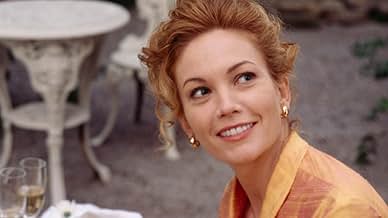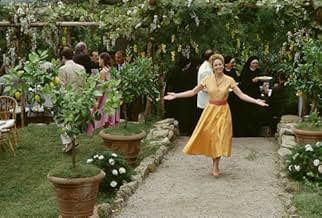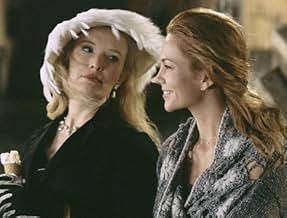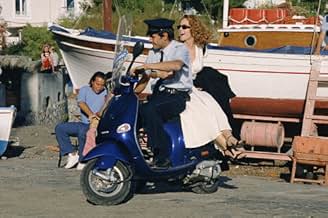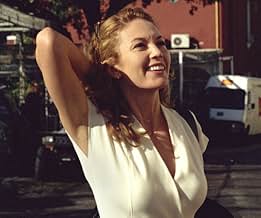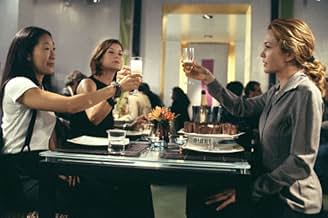Una escritora compra una villa en la Toscana con la esperanza de cambiar su vida.Una escritora compra una villa en la Toscana con la esperanza de cambiar su vida.Una escritora compra una villa en la Toscana con la esperanza de cambiar su vida.
- Premios
- 5 nominaciones en total
Giulia Louise Steigerwalt
- Chiara
- (as Giulia Steigerwalt)
Opiniones destacadas
So, I've heard this film got the beating because it wasn't like the book? Ah, well, trust me; I'm a huge book-lover (and Harry Potter fan), so I can say that if I had read the book and was an immense fan, I probably wouldn't have liked the film if it had taken the basis out of the original story. I truly sympathize with those of you who disliked this film because it did not go with the book in some way or another. ;)
Although, since I love writing myself, I have a very wonderful relationship with this film and its delicious scenery, how the characters in it build in confidence, and the whimsical things that seem to be thrown in it artfully. Yes, there are some so-called "cliches", which is a word I hate using. We use that word to describe things that happen every day in our life, things that repeat themselves in storybooks and films and are heard so often that we are likely to vomit with expectancy of it all. But the thing that hit me about this film is that a lot of things happen that you really don't expect. The coming-of-age story has been told for ages, and will be expressed forever, with all its little tidbits of similar goings-on (serious situation happens, main character finds escape, love, broken heart, confusion..etc.). I don't think an entire genre of literature can deny its existence, now, can it? :)
The acting is superb, and it has a lot of light-hearted moments that lift it up. It's basically about accepting yourself before you can truly find "Mr.Right", and realizing that you shouldn't put the blame on yourself for every single thing in your life that happens, and about taking chances because life can have pros and cons. I even think that some men would like it. This film was very inspiring to me, and although I didn't see it in theaters, I left my couch feeling very creative and content, as if I wasn't the only one who got inspiration from the little things life seems to hand out.
Although, since I love writing myself, I have a very wonderful relationship with this film and its delicious scenery, how the characters in it build in confidence, and the whimsical things that seem to be thrown in it artfully. Yes, there are some so-called "cliches", which is a word I hate using. We use that word to describe things that happen every day in our life, things that repeat themselves in storybooks and films and are heard so often that we are likely to vomit with expectancy of it all. But the thing that hit me about this film is that a lot of things happen that you really don't expect. The coming-of-age story has been told for ages, and will be expressed forever, with all its little tidbits of similar goings-on (serious situation happens, main character finds escape, love, broken heart, confusion..etc.). I don't think an entire genre of literature can deny its existence, now, can it? :)
The acting is superb, and it has a lot of light-hearted moments that lift it up. It's basically about accepting yourself before you can truly find "Mr.Right", and realizing that you shouldn't put the blame on yourself for every single thing in your life that happens, and about taking chances because life can have pros and cons. I even think that some men would like it. This film was very inspiring to me, and although I didn't see it in theaters, I left my couch feeling very creative and content, as if I wasn't the only one who got inspiration from the little things life seems to hand out.
Poet and writer Frances Mayes became a household name when in 1996 she published "Under the Tuscan Sun", a book where she detailed how she and her new lover bought and renovated an abandoned villa in Tuscany, Italy. With her stylish prose, she made the book something more than a mere diary of the renovation and turned into a captivating chronicle of her trips through Italy and her familiarization with the country's rich culture. The book's detailed account of Mayes' trips attracted director Audrey Wells, who used the book's story of the renovation of an Italian villa as a basis for this charming romantic comedy set in Tuscany and starring Diane Lane.
Frances (Diane Lane) is a writer in her mid-30s currently suffering writer's block, but this is the lesser of her problems, as her husband suddenly decides to divorce her and as a result of legal issues, he keeps their house. Without a place to call home, Frances enters a state of depression, but her friend Patti (Sandra Oh) has a solution. Since Patti (who is a lesbian) has become pregnant, she and her partner offer Frances their tickets to Italy and convince her to take a holiday. While traveling through Tuscanny with the tour, Frances finds an abandoned villa for sale, and impulsively (and thanks to a series of consequences), she decides to buy it. "Under the Tuscan Sun" details France's efforts to renovate the villa and her life at the same time, as well as her encounters with many interesting characters from the beautiful Italian region.
Well, it is safe to point out that other than the tale of the renovation of an old house, Audrey Well's adaptation of the story has little to no resemblance to the book's plot. However, the way Wells mixes Mayes' Italian adventure with her character's own tribulations is almost perfect. True, the movie's plot is a bit typical and filled with some of the most common clichés in the romantic comedy genre, but it also offers some really nice (and unexpected) twists to the formula. While not exactly the detailed travelogue that Mayes' book is, this version of "Under the Tuscan Sun" really captures the magic of the Italian region and accurately shows off bits of the country's culture despite the funny use of classic stereotypes.
Director Audrey Wells takes a straight forward approach to her story, but wisely, takes full advantage of the location's awesome landscapes and the enormous talent of cinematographer Geoffrey Simpson. Together, Simpson and Wells create beautiful vistas of Italy's famous countryside that often mimic in a cleverly fashion some very well-known paintings of the same locations. The film's cinematography is definitely the movie's main asset, but it's not the only good thing in the film. While in terms of style Wells follows the romantic comedy formula somewhat to the letter, the movie is filled with a very human touch that most movies of this genre lack.
Diane Lane is simply perfect as the movie's main character, as while the role may be a bit typical, she truly added her talents to the part and made Frances a very real and likable woman. Sandra Oh is good as Frances' best friend Patti, although really less convincing than Lane. Vincent Riotta is the film's highlight, as the helpful Mr. Martini who also gives two or three lessons to the stranger in a strange land. Lindsay Duncan appears as the strange Katherine, and plays an over-the-top character with dignity and charm. Overall the rest of the cast was very good, with everyone being perfect to the part although nothing really special. By the way, watch out for a small appearance of legendary director Mario Monicelli in a small role.
It's impossible to compare the film to the book as they are both very different beasts, with very little in common; so fans of the book won't find a faithful adaptation despite the gorgeous images of Italy. As a film, "Under the Tuscan Sun" is a very effective melodrama, as while it's certainly sappy and silly at times, it offers a breath of fresh air when compared to other similar films. True, it's story may not be the most original one, but the way it's executed it's strangely charming, as if the beautiful cinematography and witty script were able to cast a magic spell on the viewers and simply captivate with their simple beauty.
It's easy to dismiss "Under the Tuscan Sun" as another silly romantic comedy filled with typical clichés and sappy situations; but while those descriptions often prove true to this film, there is something else, something more that this movie offers that makes it special, and a truly different experience to those used to watch the same plots in melodramas over and over. "Under the Tuscan Sun" may not be true to its source book, but it uses it cleverly to tells a really charming story. 7/10
Frances (Diane Lane) is a writer in her mid-30s currently suffering writer's block, but this is the lesser of her problems, as her husband suddenly decides to divorce her and as a result of legal issues, he keeps their house. Without a place to call home, Frances enters a state of depression, but her friend Patti (Sandra Oh) has a solution. Since Patti (who is a lesbian) has become pregnant, she and her partner offer Frances their tickets to Italy and convince her to take a holiday. While traveling through Tuscanny with the tour, Frances finds an abandoned villa for sale, and impulsively (and thanks to a series of consequences), she decides to buy it. "Under the Tuscan Sun" details France's efforts to renovate the villa and her life at the same time, as well as her encounters with many interesting characters from the beautiful Italian region.
Well, it is safe to point out that other than the tale of the renovation of an old house, Audrey Well's adaptation of the story has little to no resemblance to the book's plot. However, the way Wells mixes Mayes' Italian adventure with her character's own tribulations is almost perfect. True, the movie's plot is a bit typical and filled with some of the most common clichés in the romantic comedy genre, but it also offers some really nice (and unexpected) twists to the formula. While not exactly the detailed travelogue that Mayes' book is, this version of "Under the Tuscan Sun" really captures the magic of the Italian region and accurately shows off bits of the country's culture despite the funny use of classic stereotypes.
Director Audrey Wells takes a straight forward approach to her story, but wisely, takes full advantage of the location's awesome landscapes and the enormous talent of cinematographer Geoffrey Simpson. Together, Simpson and Wells create beautiful vistas of Italy's famous countryside that often mimic in a cleverly fashion some very well-known paintings of the same locations. The film's cinematography is definitely the movie's main asset, but it's not the only good thing in the film. While in terms of style Wells follows the romantic comedy formula somewhat to the letter, the movie is filled with a very human touch that most movies of this genre lack.
Diane Lane is simply perfect as the movie's main character, as while the role may be a bit typical, she truly added her talents to the part and made Frances a very real and likable woman. Sandra Oh is good as Frances' best friend Patti, although really less convincing than Lane. Vincent Riotta is the film's highlight, as the helpful Mr. Martini who also gives two or three lessons to the stranger in a strange land. Lindsay Duncan appears as the strange Katherine, and plays an over-the-top character with dignity and charm. Overall the rest of the cast was very good, with everyone being perfect to the part although nothing really special. By the way, watch out for a small appearance of legendary director Mario Monicelli in a small role.
It's impossible to compare the film to the book as they are both very different beasts, with very little in common; so fans of the book won't find a faithful adaptation despite the gorgeous images of Italy. As a film, "Under the Tuscan Sun" is a very effective melodrama, as while it's certainly sappy and silly at times, it offers a breath of fresh air when compared to other similar films. True, it's story may not be the most original one, but the way it's executed it's strangely charming, as if the beautiful cinematography and witty script were able to cast a magic spell on the viewers and simply captivate with their simple beauty.
It's easy to dismiss "Under the Tuscan Sun" as another silly romantic comedy filled with typical clichés and sappy situations; but while those descriptions often prove true to this film, there is something else, something more that this movie offers that makes it special, and a truly different experience to those used to watch the same plots in melodramas over and over. "Under the Tuscan Sun" may not be true to its source book, but it uses it cleverly to tells a really charming story. 7/10
Admittedly, I was surprised. This isn't the type of movie that normally appeals to me, and yet I was really quite taken with it on a number of counts. It could be described as a very gentle movie (even mildly spiritual in some ways) full of sage advice about life and how to handle the disappointments that naturally appear, and - being somewhat stereotypically Italian in its presentation - it has a lot about love and romance and flirtatiousness in it. It even packs a bit of humour. Not a typical guy's movie, but still very pleasant viewing. What I particularly liked was the premise that essentially started the whole thing off. Frances (in a great performance by Diane Lane) discovers that her husband is having an affair, and they end up divorced - and, she being the primary bread winner - he gets the house and alimony. The lesson? When your life falls apart, move on to something completely different and start picking up the pieces. Frances buys a villa in Tuscany and restarts her life, with us watching. Her problems aren't solved. She seems to think that everything revolves around finding a man and romance, but - as her friend Martini points out near the end of the movie - she ends up with everything she wanted - just not in the way she expected to get it.
At times, it's a bit slow-paced, and it's not "exciting" in the way we think of the word, but it's got a quality that draws you into it. As far as the story is concerned, my only quibble might be the introduction of the character of "Ed" right at the end of the movie. Everything to that point had led to the understanding that Frances didn't need romance to be fulfilled; she had found her fulfillment with the people she had assembled around her, who had become a surrogate family. I suppose it's nice that she found someone to love, but the movie on the whole would have been more satisfying if it had ended with the gathering at the dinner table with all her friends - without Ed! That was an unsatisfying intrusion into an otherwise satisfying story. 7/10
At times, it's a bit slow-paced, and it's not "exciting" in the way we think of the word, but it's got a quality that draws you into it. As far as the story is concerned, my only quibble might be the introduction of the character of "Ed" right at the end of the movie. Everything to that point had led to the understanding that Frances didn't need romance to be fulfilled; she had found her fulfillment with the people she had assembled around her, who had become a surrogate family. I suppose it's nice that she found someone to love, but the movie on the whole would have been more satisfying if it had ended with the gathering at the dinner table with all her friends - without Ed! That was an unsatisfying intrusion into an otherwise satisfying story. 7/10
"Under the Tuscan Sun" is a polarizing film that seems to leave viewers (and critics) either in love with a story of growth and renewal or dismissive of its line. I'm firmly in the former camp.
Based so loosely on Frances Mayes's own account of her regeneration in beautiful Italy as to carry an end credit pronouncing that substantial fictionalization replaced key true details, writer and director Audrey Wells crafted a stunning vehicle for Diane Lane whose radiance projects from the screen powerfully. And in every scene.
Diane Lane, as the changed-from-the-memoir Frances, abandons San Francisco after her never shown cad husband divorces her, getting the house she once loved. Frances is a writer and literary critic. Why does she leave S.F.? Two of her closest friends give her a ticket for a gay bus tour of Italy and she jumps off the bus to look into a ramshackle old country house up for sale. Impetuosity? Definitely. Believable? Yes, actually.
Frances' new house isn't a handyman's special, it's a contractor's assurance of food on the table for a very long time. Frances adapts to the house and the locals with remarkable aplomb. Tuscany is sunny but its light fades before Frances's challenged but resilient commitment to not just restore a house but to create a home. The two aren't the same. I'm not sure how many male directors could so well create that reality.
Director Wells tells the story from a woman's heart but with a breadth of humor and drama that should appeal to anyone who wants to believe, or needs to hope, that there really is a light at the end of the tunnel of marital infidelity and dissolution.
Supporting Diane Lane is Sandra Oh as Patti, her closest friend. In relatively short scenes, Ms. Oh displays a lively and laconic grasp not only of her friend's life but also of her own which is not, as they say today, devoid of "issues."
Lindsay Duncan is Katharine, an older woman determined to hold on to her now fading attractiveness through a blend of humor, earthiness - and alcohol. Her character may be predictable but she's also fun.
Raoul Bova has garnered some press attention as handsome Marcello, the romantically available and affluent Italian. That's a character we've seen in many, many films and Bova delivers an expectedly satisfactory but hardly deep performance.
Yes, Diane Lane is beautiful but there is much more to her acting than a shining appearance. Her facial gestures, mirroring her emotions as they shift from moment to moment, are the product of extraordinary acting ability. And her character draws a powerful portrayal.
Credit also must go to cinematographer Geoffrey Simpson. Perhaps it would be impossible for a blind camera director to turn in anything but a gorgeous visage of rural and urban Italy but Simpson did do a marvelous job of making the locales come alive.
This is a film for adults, for people who can understand pain and the search for recovery and understand the difficulty of coming back from a space that once offered the mirage of safety and security.
I loved this film.
9/10.
Based so loosely on Frances Mayes's own account of her regeneration in beautiful Italy as to carry an end credit pronouncing that substantial fictionalization replaced key true details, writer and director Audrey Wells crafted a stunning vehicle for Diane Lane whose radiance projects from the screen powerfully. And in every scene.
Diane Lane, as the changed-from-the-memoir Frances, abandons San Francisco after her never shown cad husband divorces her, getting the house she once loved. Frances is a writer and literary critic. Why does she leave S.F.? Two of her closest friends give her a ticket for a gay bus tour of Italy and she jumps off the bus to look into a ramshackle old country house up for sale. Impetuosity? Definitely. Believable? Yes, actually.
Frances' new house isn't a handyman's special, it's a contractor's assurance of food on the table for a very long time. Frances adapts to the house and the locals with remarkable aplomb. Tuscany is sunny but its light fades before Frances's challenged but resilient commitment to not just restore a house but to create a home. The two aren't the same. I'm not sure how many male directors could so well create that reality.
Director Wells tells the story from a woman's heart but with a breadth of humor and drama that should appeal to anyone who wants to believe, or needs to hope, that there really is a light at the end of the tunnel of marital infidelity and dissolution.
Supporting Diane Lane is Sandra Oh as Patti, her closest friend. In relatively short scenes, Ms. Oh displays a lively and laconic grasp not only of her friend's life but also of her own which is not, as they say today, devoid of "issues."
Lindsay Duncan is Katharine, an older woman determined to hold on to her now fading attractiveness through a blend of humor, earthiness - and alcohol. Her character may be predictable but she's also fun.
Raoul Bova has garnered some press attention as handsome Marcello, the romantically available and affluent Italian. That's a character we've seen in many, many films and Bova delivers an expectedly satisfactory but hardly deep performance.
Yes, Diane Lane is beautiful but there is much more to her acting than a shining appearance. Her facial gestures, mirroring her emotions as they shift from moment to moment, are the product of extraordinary acting ability. And her character draws a powerful portrayal.
Credit also must go to cinematographer Geoffrey Simpson. Perhaps it would be impossible for a blind camera director to turn in anything but a gorgeous visage of rural and urban Italy but Simpson did do a marvelous job of making the locales come alive.
This is a film for adults, for people who can understand pain and the search for recovery and understand the difficulty of coming back from a space that once offered the mirage of safety and security.
I loved this film.
9/10.
OK, first of all a heads up... I'm a British man of 56, having just watched this on the TV on a lazy Sunday afternoon, when I could of been catching up with Glastonbury or the football (Euro 2016). Not, I guess, the target audience.
Well, as I sat there on the sofa with my cuppa, enjoying the scenery, and this striking lady who I hadn't seen before, (trust me, I know Diane now, and have a list of her films to watch), I just became entranced.
I know I'm being manipulated, the mass of stereotypes, the fact (unlike most of us) she can just cash buy a villa on a whim, BUT, I gave in and went for the ride, and it couldn't of been better. I didn't want it to end, the feel good, the decent people, the Tuscan sun! Add in fellow Brit Lindsay Duncan's great performance, the ensemble cast, and you have a joy to watch which surely will make anyone feel better.
Well, as I sat there on the sofa with my cuppa, enjoying the scenery, and this striking lady who I hadn't seen before, (trust me, I know Diane now, and have a list of her films to watch), I just became entranced.
I know I'm being manipulated, the mass of stereotypes, the fact (unlike most of us) she can just cash buy a villa on a whim, BUT, I gave in and went for the ride, and it couldn't of been better. I didn't want it to end, the feel good, the decent people, the Tuscan sun! Add in fellow Brit Lindsay Duncan's great performance, the ensemble cast, and you have a joy to watch which surely will make anyone feel better.
¿Sabías que…?
- TriviaThe elderly owner of Bramasole, grateful for a sign that Frances is the "right" buyer, cries out, "Grazie, Santo Francesco!" when a bird defecates on Frances' head. "Santo Francesco" is Saint Francis, the patron saint of animals.
- ErroresWhen Signor Martini is next to the fireplace telling Frances about the train tracks through the mountains, the matchbox behind him moves around the top of the fire place.
- ConexionesFeatured in Late Night with Conan O'Brien: Diane Lane/Wanda Sykes/Jonny Lang (2003)
- Bandas sonorasSaturday Night (Is the Loneliest Night in the Week)
Written by Sammy Cahn and Jule Styne
Performed by The Oscar Peterson Trio
Courtesy of The Verve Music Group
Under license from Universal Music Enterprises
Selecciones populares
Inicia sesión para calificar y agrega a la lista de videos para obtener recomendaciones personalizadas
Detalles
- Fecha de lanzamiento
- Países de origen
- Idiomas
- También se conoce como
- Under the Tuscan Sun
- Locaciones de filmación
- Productoras
- Ver más créditos de la compañía en IMDbPro
Taquilla
- Presupuesto
- USD 18,000,000 (estimado)
- Total en EE. UU. y Canadá
- USD 43,610,723
- Fin de semana de estreno en EE. UU. y Canadá
- USD 9,751,425
- 28 sep 2003
- Total a nivel mundial
- USD 58,878,723
- Tiempo de ejecución1 hora 53 minutos
- Color
- Mezcla de sonido
- Relación de aspecto
- 1.85 : 1
Contribuir a esta página
Sugiere una edición o agrega el contenido que falta

Principales brechas de datos
By what name was Bajo el sol de Toscana (2003) officially released in India in Hindi?
Responda


